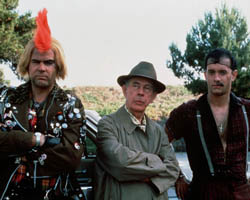
In 1962, a joint resolution of Congress made the third week of May “National Police Week,” a time to recognize the sacrifices made by the nation’s law enforcement officers. But let’s face it: unless you’ve dedicated a lot of time to breaking the law, most of what you know about the cops comes from movies and TV, and those may or may not be just the facts, ma’am. All month, Ken Jennings will be exploring the “thin blue line” between police fact and police fiction. If you actually thought this stuff was true—well, you have the right to remain silent. Anything you say can and will be used against you in the comments section.
Police Myth #1: Undercover Cops Have to Identify Themselves When Asked.
If everything you know about police procedure comes from an elite social circle of hookers, pot dealers, and paranoid college activists, then you probably agree wholeheartedly with this rule of thumb: any time you suspect someone of being a plainclothes cop, you can unmask them by this clever ruse of asking them! Presumably, at that point, the unconvincing john/buyer/whatever will shake his fist impotently at you, rip off his fake mustache, and stalk off into the night, his arrest thwarted.

But this is a fairly implausible myth, when you think about it. Most states have laws requiring cops to wear identifying badges and present ID cards upon request—but that’s not true of undercover officers. For a plainclothes cop’s cover to have any value at all, by definition, he or she must lie under many scenarios. Saying “No, I’m not a cop” is merely the most obvious of these. Courts have ruled it legal for police to lie in interrogations. (“Your buddy already sold you out.”) It’s legal for them to set up stings in which police must pretend to be criminals (“Did you bring the stuff?”) or stage phony giveaways (“You’ve won a new sports car! Just come to the police station to collect.”) In 2012, the murderer in a 36-year-old case was arrested in Seattle on DNA evidence. Cops had collected a sample of his saliva by pretending to be conducting a “chewing gum survey.”
What is true is that a cop can’t deceive you into committing a crime that you weren’t going to commit anyway. That would be entrapment. But, in general, police have broad latitude to tell necessary untruths to collect evidence, as long as they don’t violate other laws or constitutional protections to do so. The next time someone tells you, “No, of course I’m not a cop!”, just remember: that’s exactly what a cop would say! Who knows, maybe this whole myth was dreamed up by police to instill false confidence in criminals.
Quick Quiz: What band’s 1983 hit “Undercover of the Night” was the first single on their 17th studio album, Undercover?
Ken Jennings is the author of Because I Said So!, Brainiac, Ken Jennings's Trivia Almanac, and Maphead. He's also the proud owner of an underwhelming Bag o' Crap. Follow him at ken-jennings.com or on Twitter as @KenJennings.
